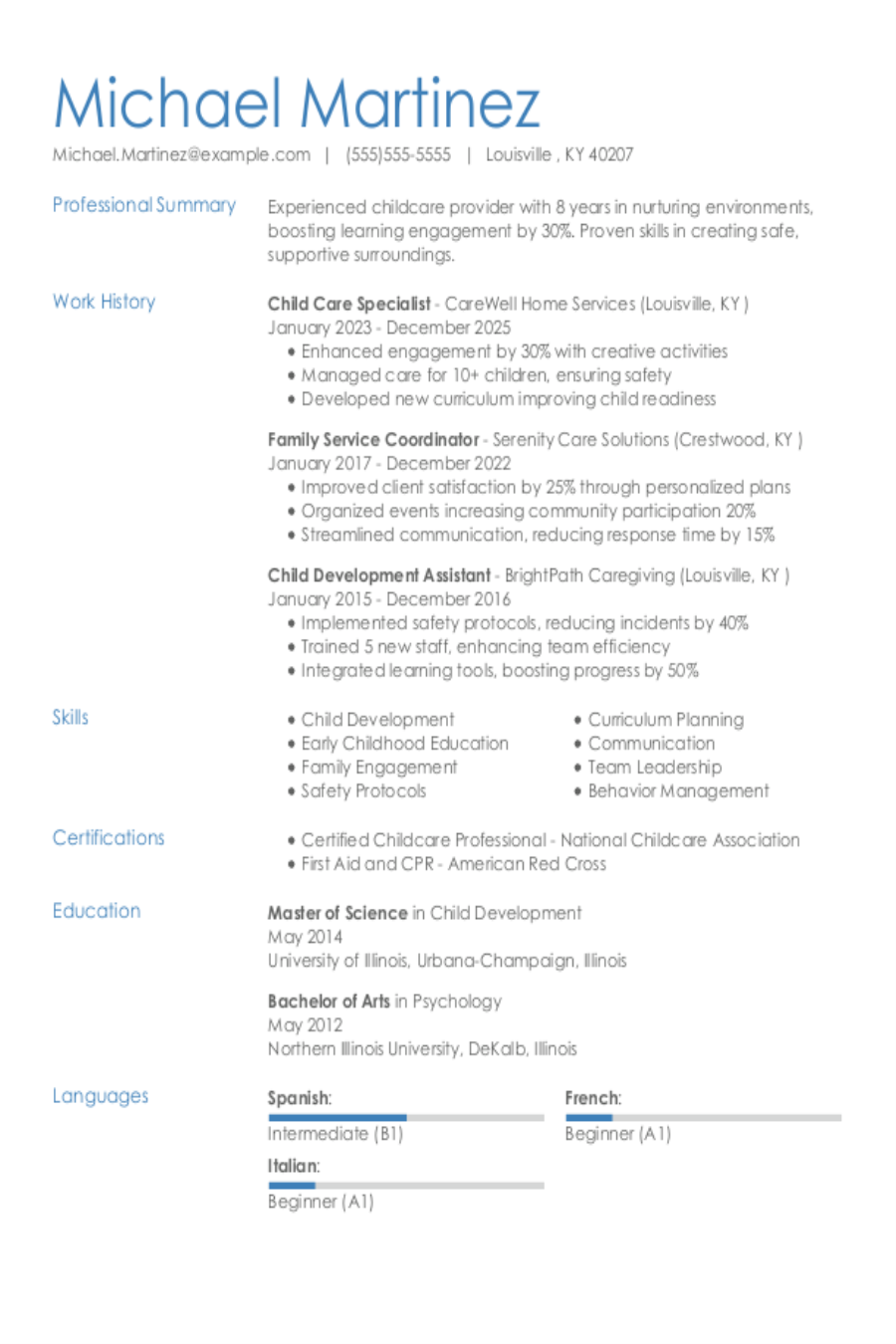Popular Hospitality Resume Examples
Entry-level hospitality resume
An entry-level resume for hospitality should emphasize customer service skills, relevant coursework, internships, and any certifications to show preparedness for a fast-paced work environment.
Showcases education: This resume features the education section near the top, enabling the candidate’s academic background to establish their authority. Including these credentials demonstrates expertise and commitment to professional growth in the hospitality field.
Emphasizes soft skills: This resume emphasizes the applicant's exceptional soft skills like interpersonal abilities and leadership qualities. These skills are highlighted by achievements such as improving guest satisfaction by 30% through effective service management, which more than compensates for limited experience in the hospitality field.
Mid-career hospitality resume
A mid-career hospitality professional's resume should emphasize a well-rounded presentation of diverse experience, key skills, and evidence of career growth to attract potential employers in the industry.
Encourages quick scanning: A well-structured design with clear sections allows hiring managers to quickly identify key qualifications and achievements, improving the overall impact of the applicant's experience.
Includes mix of skills: This resume effectively illustrates a mix of hard skills, such as revenue management and budgeting, with soft skills like leadership and customer service to present a well-rounded applicant.
Experienced hospitality resume
An experienced hospitality resume should highlight key achievements and demonstrate the job seeker’s growth within the industry in a straightforward and engaging manner.
Highlights experience: The resume's opening summary effectively showcases over 15 years of diverse hospitality experience. This immediately establishes a professional tone, highlighting the applicant's commitment to guest satisfaction and operational excellence.
Quantifies achievements: Incorporating quantifiable achievements such as a 30% increase in customer satisfaction and managing budgets over $500,000 makes accomplishments more tangible and easily understood by recruiters.
No experience hospitality resume
A resume for an applicant with no experience applying for a hospitality position should highlight customer service skills, relevant coursework, and any volunteer work to showcase the job seeker's passion and potential in the industry.
Avoids jargon: Job seekers often feel the need to embellish their experience with complex terminology, thinking it will impress employers. However, this resume's clarity and straightforward descriptions of tasks make a stronger impact, showcasing genuine skills and contributions effectively.
Emphasizes professional skills: By highlighting their strong skills in customer service and event planning, the job seeker demonstrates readiness for hospitality roles despite limited formal experience, showcasing valuable contributions to potential employers.
More resume examples
Hospitality Resume Template
Looking to craft a standout application? Begin with this hospitality resume template as your guide—just personalize it with your own details for a unique touch.
John Zhang
Parkview, MO 64158
(555)555-5555
John.Zhang@example.com
Professional Summary
Dynamic hospitality professional with 6 years of experience in guest relations. Adept at improving customer service, leading teams, and increasing revenue. Proven track record in process optimization and conflict resolution.
Work History
Hospitality
Dreamland Resort - Parkview, MO
January 2023 - November 2025
- Coordinated guest services for 150+ clients daily
- Implemented a new check-in system reducing wait time by 30%
- Upsold services, increasing monthly revenue by $5,000
Guest Relations Manager
Sunnyvale Resort - St. Louis, MO
January 2020 - December 2022
- Trained 20+ new hires on guest service protocols
- Improved customer satisfaction rate by 15%
- Developed guest satisfaction surveys increasing feedback by 40%
Front Desk Supervisor
SeaView Hotel - St. Louis, MO
January 2017 - December 2019
- Managed daily operations of front desk with 5 staff members
- Reduced check-in time by 25% through process improvement
- Generated end-of-day financial reports balancing daily revenue
Skills
- Customer Service
- Hospitality Management
- Conflict Resolution
- Upselling Techniques
- Team Leadership
- Process Improvement
- Revenue Growth
- Guest Relations
Certifications
- Certified Hospitality and Tourism Management Professional - American Hotel & Lodging Educational Institute
- Front Desk Representative - American Hotel & Lodging Educational Institute
Education
Master in Business Administration Hospitality Management
University of Central Florida Orlando, Florida
May 2017
Bachelor of Arts Hospitality and Tourism
Florida State University Tallahassee, Florida
May 2015
Languages
- Spanish - Beginner (A1)
- French - Beginner (A1)
- Italian - Beginner (A1)
Writing Your Hospitality Resume
Having explored these compelling resume examples, you are now prepared to dive into the process of crafting your own resume. We'll provide a step-by-step guide that thoroughly covers each section and breaks down how to write a resume.
List your most relevant skills
A powerful hospitality resume requires a well-crafted skills section that showcases your expertise in customer service, teamwork, and conflict resolution. You should highlight both technical abilities like reservation systems and soft skills like effective communication.
To make your skills stand out, thoroughly review the job listing and incorporate relevant keywords from the job listing. Using these keywords not only demonstrates that you possess the necessary qualifications but also helps ensure that applicant tracking systems recognize you as a strong applicant. By aligning your skills with their needs, you'll increase your chances of catching the attention of recruiters in the competitive hospitality industry.
Example of skills on a hospitality resume
- Proficient in managing guest relations and ensuring exceptional service
- Adept at coordinating events and handling logistics seamlessly
- Strong communicator with a knack for building rapport with diverse clientele
- Resourceful team player committed to maintaining a positive work environment
A strong skills section is key for showcasing your readiness in the hospitality industry. It should incorporate both technical skills specific to the job description, such as customer service expertise and food safety knowledge, alongside essential soft skills like communication and teamwork. This mix will demonstrate your comprehensive preparation to excel in the role.
Highlight your work history
Your work experience section should focus on showcasing results that demonstrate your impact in previous roles, using descriptive language that captures the attention of hiring managers.
Each job entry should include key information such as your job title, the name of the employer, and the dates you worked there. This establishes context and credibility. Be sure to emphasize specific accomplishments that reflect your contributions to guest satisfaction or operational efficiency within the hospitality sector.
Example of a hospitality work experience entry
- Hospitality Coordinator
Marriott Hotels - Orlando, FL
June 2021 - Present - Manage check-in and check-out procedures for approximately 150 guests daily, ensuring a seamless and welcoming experience
- Deliver outstanding customer service by addressing guest inquiries and resolving issues promptly, achieving a 98% positive feedback score on surveys
- Coordinate with housekeeping and maintenance teams to uphold hotel standards of cleanliness and functionality, resulting in improved guest satisfaction ratings
- Use reservation systems to secure bookings efficiently while maximizing occupancy rates during peak seasons, contributing to a 15% increase in revenue
- Train new staff members on front desk operations and customer service excellence, reducing onboarding time by 25%
Focusing on outcomes and achievements in the experience section is essential for making a lasting impression on employers. Highlighting your successes demonstrates your ability to add value and solve problems, rather than simply listing daily tasks. This method showcases your unique contributions and sets you apart in a competitive hospitality job market.
Include your education
The education section of your hospitality resume should list your diplomas and degrees in reverse-chronological order, starting with your most recent qualification. Include relevant degrees, diplomas, and any professional certifications while omitting your high school diploma if you possess a higher degree.
If you are currently enrolled in a program or have incomplete education, state your highest completed level along with an expected graduation date. For those who are recent graduates or still studying, it is beneficial to add bullet points that highlight relevant coursework and any academic achievements.
Common certifications for a hospitality resume
- Certified Hospitality Supervisor (CHS) – American Hotel and Lodging Educational Institute (AHLEI)
- Certified Guest Service Professional (CGSP) – American Hotel and Lodging Educational Institute (AHLEI)
- Hospitality Management Diploma – Institute of Hospitality
- Certified Meeting Professional (CMP) – Events Industry Council
Sum up your resume with an introduction
Creating an effective profile section for your resume is essential for making a strong first impression on potential employers. This serves as your personal introduction, giving hiring managers insight into your career trajectory and the value you bring to their organization.
If you have significant experience in hospitality, a professional summary can be particularly beneficial. It allows you to showcase key achievements and skills right at the top of your resume. If you’re entering the workforce, try adding a resume objective that highlights your commitment to progressing in your career.
Professional summary example
Dynamic hospitality professional with over 10 years of experience in managing high-volume restaurants and hotels. Demonstrated success in improving guest experiences through exceptional service, effective staff training, and operational efficiency. Expert in event coordination, customer relations, and revenue management, consistently driving business growth and repeat patronage.
Resume objective example
Enthusiastic hospitality professional eager to bring a passion for customer service and teamwork to a vibrant establishment. Aiming to use strong communication and problem-solving skills to improve guest experiences while contributing to a positive work environment.
As a hospitality applicant, your resume profile should be concise and packed with essential information. Aim for no more than three sentences that highlight your key strengths and experiences. To maintain focus and impact, save any additional details for your cover letter instead of including them in the profile.
Add unique sections to set you apart
Improve your resume by including optional sections that highlight your unique qualifications for hospitality positions. These sections allow you to present a well-rounded view of yourself, showcasing what sets you apart as a job seeker.
By incorporating relevant hobbies and volunteer experiences, you can demonstrate the values and skills that align with the hospitality industry. Sharing your passion for community service or detailing how you've developed customer service skills through various activities gives employers insight into your character and working style.
Three sections perfect for a hospitality resume
- Languages: In hospitality, effective communication is important for guest satisfaction. If you know multiple languages, showcase your language skills on your resume to improve interactions and accommodate diverse clientele.
- Volunteer Work: Including volunteer work on a resume not only showcases your dedication to helping others but also highlights valuable skills that improve your professional profile. It tells employers you care about your community and personal growth.
- Accomplishments: In hospitality, measurable results are essential to showcase your effectiveness in improving guest experiences. Include these achievements in your job descriptions or create an accomplishments section to spotlight them.
5 Resume Formatting Tips
- Choose a format that matches your career stage.
Choosing the right resume format is important for showcasing your skills. If you're an experienced professional, a chronological format highlights your career progression effectively. For those just starting out, a functional resume emphasizes your abilities over experience. Consider a combination format if you want to present both aspects in a balanced way.
- Pick a smart resume template.
Using a professional resume template improves your document's readability. A well-structured template allows hiring managers to quickly grasp your qualifications. When choosing a custom format, prioritize clarity and select fonts that are easy to read to ensure your resume stands out in applicant tracking systems.
- Select an appropriate font.
Select a clear and professional font to improve your resume's readability. Fonts like Helvetica, Garamond, or Verdana can help ensure your application stands out to both ATS and hiring managers.
- Use consistent formatting.
Ensure your resume features left-alignment with even margins. This creates a clean, professional look that improves readability and makes a strong impression on employers.
- Keep your resume to one or two pages.
Remember, resumes should be one page long to ensure a clear and effective presentation of your skills. Concentrate on the most relevant details that highlight your strengths in the hospitality industry.
Tools for Your Job Search
Are you ready to pursue that exciting opportunity in the hospitality industry? Before you hit submit on your application, take advantage of our ATS Resume Checker. This essential tool provides insights into how well your resume aligns with automated systems commonly used by employers in hospitality for initial job seeker screening.
Need a boost in showcasing your experience? Our AI Resume Builder is here to help! It offers tailored recommendations based on your specific skills and background, alongside professionally designed templates that ensure your qualifications stand out to hiring managers.
Frequently Asked Questions
Last Updated: November 22, 2025
Absolutely. A cover letter is important because it adds depth to your resume and opens doors for communication with potential employers. It allows you to express why you’re passionate about the hospitality role and how your unique skills make you an ideal applicant. Don’t miss out—write a cover letter that showcases your enthusiasm and qualifications.
For a quick and efficient solution, try our AI Cover Letter Generator. This tool helps you create tailored, job-winning cover letters in just minutes! Plus, choose from various cover letter template options that perfectly match your resume, ensuring a polished presentation of your professional journey.
A resume is generally a concise document, spanning one to two pages and summarizing your skills and job experiences. In contrast, a CV (curriculum vitae) can be several pages long and provides extensive information about your educational background, research contributions, publications, and professional experiences.
You typically need a CV for positions in academia, research, law, or specialized fields. If you find yourself needing to create a CV, our online CV Maker is here to assist you. With a variety of customizable CV templates tailored for different industries and career levels, you can quickly produce a professional document that meets your needs.
A hospitality resume should ideally be one page long, as this is typically sufficient to highlight your skills and experience. However, if you have extensive background or a diverse range of qualifications, consider extending it to a two-page resume to capture all relevant details.
To write a strong CV, start by organizing your information under clear headings like education, work experience, and skills. Use professional templates that are both visually appealing and optimized for applicant tracking systems. Incorporate relevant keywords from the job description to tailor your CV for each application, boosting your chances of drawing attention.
You can also explore CV examples created by industry professionals to understand effective presentation techniques. These examples can inspire new ways to highlight your qualifications and make them stand out to employers.
An active LinkedIn presence is important for hospitality professionals seeking job opportunities. Use your profile to connect with industry peers and highlight your skills to attract potential employers.
Practice answering common job interview questions and answers to boost your confidence. This preparation not only helps you articulate your thoughts clearly but also equips you to handle any curveballs that may come your way during the interview.
Was this information helpful? Let us know!
Hailey is a career advice writer dedicated to helping job seekers excel in their careers.
More resources

Bad Cover Letter Examples: How To Fix Those Annoying Mistakes
Check out four sample cover letters and then learn from a pro...
![Communication Skills for Your Resume [40+ Examples and How to Improve Them] Communication Skills for Your Resume [40+ Examples and How to Improve Them]](/sapp/uploads/2025/08/Communication-skills.png)
Communication Skills for Your Resume [40+ Examples and How to Improve Them]
Good communication skills can propel your personal and profess...

How to List Language Skill Levels on Your Resume
Language skills give you an instant advantage in the job marke...

Interview-Winning Entertainment Resumes Examples and Tips
Was this information helpful? Let us know ...



